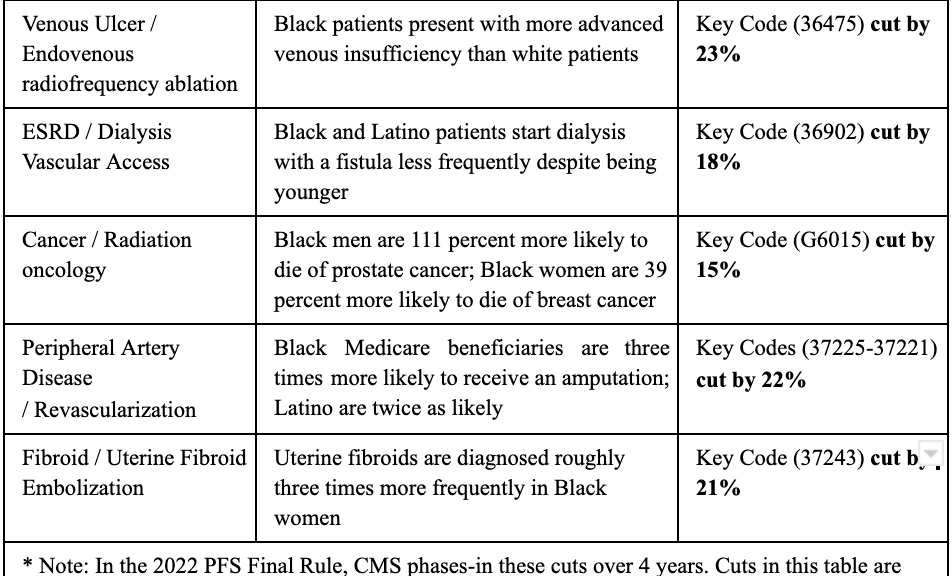[ad_1]

As these combined cuts are phased-in over the next four years, they will do lasting damage to specialty providers under the PFS, accelerate health system consolidation, and further undermine the Part A Trust Fund as patients are forced to move to higher cost sites-of-service.
WASHINGTON (PRWEB)
December 02, 2021
On November 19, the Centers for Medicare & Medicaid Services (CMS) released the CY22 Physician Fee Schedule (PFS) final rule, which contains huge 20 percent cuts to specialty providers as a result of the so-called “clinical labor” update. These cuts follow on the heels of the CY21 PFS final rule which included an across the board cut to the conversion factor of 10 percent, a cut so large that Congress was obliged to step in and block the cuts as part of H.R. 133, the Consolidated Appropriations Act of 2021. As these combined cuts are phased-in over the next four years, they will do lasting damage to specialty providers under the PFS, accelerate health system consolidation, and further undermine the Part A Trust Fund as patients are forced to move to higher cost sites-of-service.
These reductions also disproportionately impact minority populations as exemplified below:
->Venous Ulcer / Endovenous radiofrequency ablation — Black patients present with more advanced venous insufficiency than white patients: Key Code (36475) cut by 23%
-> ESRD / Dialysis Vascular Access — Black and Latino patients start dialysis with a fistula less frequently despite being younger: Key Code (36902) cut by 18%
->Cancer / Radiation oncology — Black men are 111 percent more likely to die of prostate cancer; Black women are 39 percent more likely to die of breast cancer: Key Code (G6015) cut by 15%
->Peripheral Artery Disease/ Revascularization — Black Medicare beneficiaries are three times more likely to receive an amputation; Latino are twice as likely: Key Codes (37225-37221) cut by 22%
->Fibroid / Uterine Fibroid Embolization — Uterine fibroids are diagnosed roughly three times more frequently in Black women: Key Code (37243) cut by 21%
*Note: In the 2022 PFS Final Rule, CMS phases-in these cuts over 4 years. Cuts in this table are estimates based on the 2022 PFS Proposed Rule as CMS did not publish the effects of the cuts over the 4-year period.
Ongoing cuts to office-based specialists under the PFS also are weakening our healthcare system’s ability to deal with the ongoing COVID-19 pandemic. A key lesson learned since the start of the pandemic is that it is critical that hospitals be able to focus on our sickest pandemic patients. Yet many other patients dealing with cancer, end-stage renal disease, critical-limb ischemia, and other post-acute issues cannot wait for the cancer care, dialysis vascular access repair, limb salvage, imaging, physical therapy, etc. that is critical to keeping them alive or out of the hospital. Office-based care under the PFS provides a critical site-of-service outside of the hospital to deal with non-COVID cases so hospitals can focus on a resurging pandemic. Conversely, ongoing cuts to PFS providers threaten the resilience of our health care system to deal with this or any other pandemic. It is clear that any benefits of proceeding with the clinical labor policy at this time are far outweighed by the negative impacts on PFS specialists.
H.R. 6048, introduced by Congressman Bobby Rush (D-IL) and Congressman Gus Bilirakis (R-FL), would direct the Secretary of Health and Human Services to maintain current clinical labor data in the PFS database and report to Congress on fundamental reform of the PFS. Specialty care providers are urging all the members of Congress to work in a bipartisan fashion to halt the clinical labor cuts for 2022, support H.R. 6048, and work on fundamental reform of the Physician Fee Schedule.
Specialty provider societies and groups in support of H.R. 6048 include:
American College of Radiation Oncology
American Society of Diagnostic and Interventional Nephrology
American Society of Nuclear Cardiology
American Vein & Lymphatic Society
American Venous Forum
Alliance for Physical Therapy Quality and Innovation
Association of Black Cardiologists
CardioVascular Coalition
Dialysis Vascular Access Coalition
The Fibroid Coalition
Outpatient Endovascular and Interventional Society
Preventive Cardiovascular Nurses Association
Renal Physicians Association
Society for Cardiovascular Angiography & Interventions
Society of Interventional Radiology
Society for Vascular Medicine
United Specialists for Patient Access
Share article on social media or email:
[ad_2]

